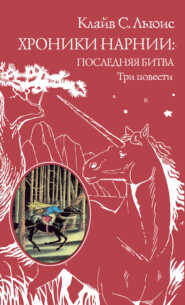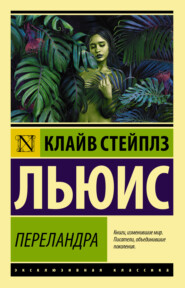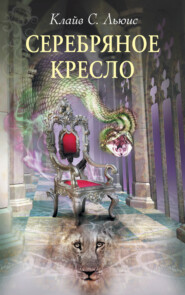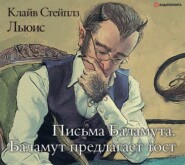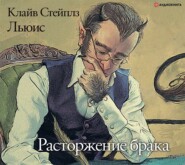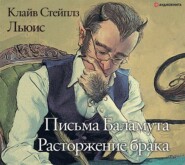По всем вопросам обращайтесь на: info@litportal.ru
(©) 2003-2024.
✖
Collected Letters Volume Three: Narnia, Cambridge and Joy 1950–1963
Настройки чтения
Размер шрифта
Высота строк
Поля
Dec 28th 53
Dear Mrs. Van Deusen
Thanks for yr. letter of the 20th: my congratulations to yr. husband on his interesting work. About Paul, I believe (having been a sickly child myself) that there are compensations. I think that from many minor illnesses in the first 12 years one develops sometimes a certain amount of immunity later on: ones system has had so much practice in dealing with bacilli. It also probably helps to make one a reader: not that there isn’t a danger of falling or sinking too far into the life of the imagination, but a habit of reading is a great source of happiness.
I think someone ought to write a book on ‘Christian life for Laymen under a bad Parish Priest’ for the problem is bound to occur in the best churches. The motto wd. be of course Herbert’s lines about the sermon ‘If all Jack sense, God takes a text and preaches patience’.
(#ulink_71ad4e36-cb14-52b4-ba26-8a2883e6baa2)
Like you, we suffer (but under a v. good priest) from the virtual extinction of Morning Prayer in favour of an 11 o’clock Celebration.
(#ulink_c5e4eb59-b78c-5b23-9fd3-41ecbca0e129) But I suppose there is something to be said for it. This is the only ritual act Our Lord commanded Himself. It is the one we can have only thro’ a priest, whereas we can all read Matins to ourselves or our families at home whenever we please. So here I have no difficulty in submission.
Is there not something especially good (and even, in the end, joyful) about mere obedience (in lawful things) to him who bears our Master’s authority, however unworthy he be–perhaps all the more, if he is unworthy? Perhaps we are put under tiresome priests chiefly to give us the opportunity of learning this beautiful & happy virtue: so that if we use the situation well we can profit more, perhaps, than we shd. have done under a better man. I have seen lovely children under not v. nice parents, & good troops under bad officers: and a good dog with a bad master is a lesson to us all. I mean, of course, as long as the bad orders are not in themselves wrong: and attendance at Holy Communion can’t be that!
Yes, we must both go on thinking about the two kinds of prayer. I think the one in Mark xi is for very advanced people: and you point out it was said to the disciples, not to the crowds. All blessings.
Yours
C. S. Lewis
TO PHYLLIS ELINOR SANDEMAN (W):
Magdalen College
Oxford
Dec 31/53
Dear Mrs Sandeman–
You have of course been much in my prayers since your first letter and today’s seems like an answer to them. I was afraid of some real crack in the structure! Now it is clear that you have to deal only with what we may call a ‘clean pain’.
I can well understand how in addition to, and mingling with, the void and loneliness, there is a great feeling of unprotectedness and a horror of coping with all the things–the harsh, outer world–from which you have hitherto been shielded. I first met this ‘cold blast on the naked heath’
(#ulink_2583416c-39ea-5734-a809-2cccb2af10db) at about 9, when my Mother died, and there has never really been any sense of security and snugness since. That is, I’ve not quite succeeded in growing up on that point: there is still too much of ‘Mammy’s little lost boy’ about me. Your position is of course v. different, both because dependence on a husband is more legitimate than dependence (after a certain age) on one’s Mother, and also because, at your age, tho’ it will feel just as bad, it is not so likely to go down into the unconscious and produce a trauma. And one sees too (tho’ it sounds brutal to say it) how this miserable necessity of fending for oneself might be an essential part of your spiritual education. I suppose God wants a bit of Imogen and Portia in you, having worked in the Miranda and Perdita part enough
(#ulink_ce53d4b7-c05e-507d-b2d1-a0fe47e343b0) (it is sometimes helpful to think of oneself as a picture wh. He is painting).
By the way, I share to the full–no words can say how strongly I share–that distaste for everything communal and collective wh. you describe in your husband. I really believe I wd. have come to Christianity much less reluctantly if it had not involved the Church. And I don’t wonder you failed to convince him that that community is perfectly right. It is holy and commanded: not at present (I think) perfect! No doubt he is learning ‘togetherness’ now as you, alas, are learning ‘aloneness’. Both painful lessons: it can so seldom happen that what we need is what we like (for if we liked it we’d have helped ourselves to it already & wouldn’t need it–aren’t children made to eat fat wh. they hate?). You will be all right, Mrs. Sandeman. All will be well in the end, tho’ by hard ways. All earthly loves go thro’ some fire before they can inherit the Kingdom. If it weren’t this, it wd. be some other fire. God bless you. Let us pray for one another.
Yours
C. S. Lewis
P.S. Of course, I’m not obeying your request, ‘Help me to find some comfort in faith again.’ We shan’t find faith by looking for comfort. That’s why, even brutally, I can’t help talking in terms of a work to be done. You are, on my view, being moved into a higher form of the great school and set harder work to do. Comfort will come as you master that work, as you learn more & more to be a channel of God’s grace to your husband (and perhaps to others): not for trying to get back the conditions you had in the lower form.
Keep clear of Psychical Researchers.
1 (#ubf0e6604-ea61-5506-9c8e-9cf752f5a457) J. Keith Kyle of the North American Service of the BBC wrote to Lewis on 31 December 1952: ‘The Columbia Broadcasting System with whom the North American Service of the BBC often co-operates…has invited us to assist them with a series called “This I Believe”…It is designed to put on the air a number of statements of personal conviction from “men and women in all stations of life, who have been successful in their chosen profession.” The CBS emphasizes that the contributions should be extremely personal in approach and as they are to be only 3 1/4 minutes in length, complete simplicity is obviously essential.’
2 (#ulink_0e319220-276e-5149-927b-e3cf7c8904e8) Pitter gave a lecture entitled ‘A Return to Poetic Law’ to the Royal Institution of Great Britain on 22 February 1952. A copy can be found in the Pitter Papers, Temporary Box, Bodleian Library.
3 (#ulink_c159b7e2-2cfc-50d4-819d-3861ae9ec1e2) Bunyan, The Pilgrim’s Progress, First Part, pp. 73-4: ‘I thought again, this Shame tells me what men are; but it tells me nothing what God or the Word of God is. And I thought moreover, That at the day of doom, we shall not be doomed to death or life according to the hectoring spirits of the world, but according to the Wisdom and Law of the Highest. Therefore thought I, what God says, is best, though all the men in the world are against it…But indeed this Shame was a bold villain; I could scarce shake him out of my company; yea, he would be haunting of me, and continually whispering me in the ear, with some one or other of the infirmities that attend Religion; but at last I told him, Twas but in vain to attempt further in this business; for those things that he disdained, in those did I see most glory; And so at last I got past this importunate one.’
4 (#ulink_adf6165a-dbf1-51cc-96ca-8c3a5c78218f) Since 1930 the Pitter family had owned a cottage in Felsted, Essex, where Ruth taught herself viticulture. The cottage, however, had to be left behind when Ruth and her companion of many years, Kathleen O’Hara, decided to buy a house in the village of Long Crendon, Buckinghamshire. ‘The Hawthorns’ in Chilton Road was set in several acres of garden and orchard, and was within reach of Oxford and London. They moved in shortly before Christmas 1953. Pitter noted: ‘In coming to the neighbourhood of Oxford, of course I had hoped to see a little more of Lewis, of David Cecil, and others, and to attend open lectures, plays, etc. But we could not find anything near enough to make this at all easy’ (Bodleian Library, MS. Eng. lett. c. 220/3, fol. 113).
5 (#ulink_9203398c-e71b-5c44-b228-0733340aaf27) Dorsett, And God Came In, ch. 3, pp. 90-1.
6 (#ulink_9b79c55b-6671-5895-ad12-8ec1baee358d) ibid., p. 91.
7 (#ulink_8ddcd352-4299-5add-8a8a-159f98ae93d8) This is a reply to a letter from Don Giovanni of 9 January 1953 (?), which appears in Letters: C. S. Lewis-Don Giovanni Calabria, pp. 76-7.
8 (#ulink_cde07621-a566-5c5b-b226-ba4df10b3710) There had been a mistake. The article, ‘Responsabilité’–which was not by Don Giovanni Calabria but by Padre Paolo Manna—was published in L’Amico, 8 (Sep.-Oct. 1952), pp. 122-4. The article is reproduced in Una Gioia Insolita, pp. 283-5.
9 (#ulink_452b325c-103f-5101-9fba-e9eec7c93e62) Lewis had only recently begun writing the book on prayer mentioned here. He mentioned it to Don Giovanni again in a letter of 17 March 1953, but had abandoned it by the following year (see the letter to Sister Penelope of 15 February 1954). He could not think how to go on with the book until, in the spring of 1963, he found the form for what he wanted to say. The result was Letters to Malcolm: Chiefly on Prayer (London: Bles, 1964; Fount, 1998).
10 (#ulink_0b860e4a-c5a0-58d6-b865-fdb9ddef9ee0) 1 Chronicles 13:9-10: ‘And when they came unto the threshingfloor of Chidon, Uzza put forth his hand to hold the ark; for the oxen stumbled. And the anger of the Lord was kindled against Uzza, and he smote him, because he put his hand to the ark: and there he died before God.’
11 (#ulink_0b860e4a-c5a0-58d6-b865-fdb9ddef9ee0) Luke 9:62: ‘And Jesus said unto him, No man, having put his hand to the plough, and looking back, is fit for the kingdom of God.’
12 (#ulink_c4b20652-c7f4-5d67-bfc5-5dff25921ecb) In ‘Responsabilità’ Fr Manna pleads for greater recognition of the gravity of Communist persecution of Christians (hospital workers as well as missionaries) in China. He argues that if a Communist (e.g., French Communist Party leader Jacques Duelos) is arrested in the West, the Communists rise in protest. There should be no less an outcry on behalf of victimized missionaries.
13 (#ulink_57cec6fa-9009-5fd2-964c-8c4c3200ded5) ‘so far as’; ‘whenever’.
14 (#ulink_2f7d864f-2fba-5238-a880-fdc94edabbf1) i.e., Paolo Manna.
15 (#ulink_6050fc51-0e1b-58db-8030-88467d7352f3) Thomas à Kempis, The Imitation of Christ, Bk. I, ch. 5.
16 (#ulink_b839c9dd-3a29-52e0-bf5a-19ea440d2160) i.e., the book on prayer.
17 (#ulink_20987078-453b-5087-9234-62367e7ff460) Matthew 26:39; Mark 14:35.
18 (#ulink_20987078-453b-5087-9234-62367e7ff460) Luke 22:42.
19 (#ulink_97d2aa07-d344-597e-a143-f2b054094bb2) Lewis read a paper on this same problem to the Oxford Clerical Society on 8 December 1953. It was published as ‘Petitionary Prayer: A Problem Without an Answer’ in Christian Reflections, ed. Walter Hooper (London: Bles, 1967; Fount, 1998).
20 (#ulink_54aa0ada-4824-51db-b424-0154a6be989a) Eustace and Edmund are characters in the Narnian stories; Jane and Mark Studdock are the married couple in That Hideous Strength.
21 (#ulink_207de6da-ae78-5957-8bb5-1cc70fd89c94) Lewis probably had in mind the last two lines of the title poem of Edna St Vincent Millay’s Renascence, and Other Poems (1925): ‘Ah, awful weight! Infinity/Pressed down upon the finite Me!’
22 (#ulink_207de6da-ae78-5957-8bb5-1cc70fd89c94) Rudolf Steiner.
23 (#ulink_5ce0bfb4-0ac0-5c7e-a8d8-e2b0359a0ff8) The Rev. Jones B. Shannon was executive director of the Church Society of College Work, Washington, DC.
24 (#ulink_9905afab-e53a-5690-b60e-3317a45a87c4) In February 1953 Joy became a member of the Episcopal Church and was confirmed in the Cathedral of St John the Divine, New York.
* (#ulink_12eb791d-2ea4-5732-9dfc-c109b98ef739) This is the beginning of Act V, I suppose?








